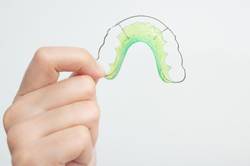
After you or your child gets your braces off, the grand reveal is one of life's super sweet moments. The perfectly straight teeth. The dazzling smile. Life is brilliant! However, once the primary orthodontia ends, know that you'll need to replace your braces with another piece of dental hardware – a retainer. By wearing a retainer, you'll help keep your teeth straight and your smile dazzling.
But how long must you wear a retainer? By learning more about the necessity of a retainer post-braces, you'll better understand the various factors that determine the length of time you'll need to sport a retainer.
Braces and Retainers: How They Work Together
Braces are necessary to correct a variety of conditions, including:
- A bad bite – also known as a malocclusion – can be an overbite or an underbite
- Crooked, crowded, spaced-out, or protruding teeth
- Jaws that don't line up correctly
- Misalignment at any point in your mouth
The type of braces you'll get typically reflects how much movement your teeth need to straighten and align perfectly. The time you need to wear braces depends on how much correction your teeth and mouth require, but it's usually two to three years.
Removing your braces after a couple or more years is certainly a reason to smile, but to retain that smile, your retainer needs to be your best friend. A retainer is a custom-made dental appliance designed to keep teeth in place after braces finally come off. It allows your newly aligned teeth time to settle into the soft tissue and jawbone that house them. Otherwise, your teeth will naturally try to shift over time.
By not wearing a retainer after braces, you could potentially undo all the beautiful work your braces put into correcting your dental issues. Not to mention that you'll have wasted all the time and costs that went into your braces. So, a retainer's an essential part of teeth straightening and alignment.
Retainer Types and Length of Time for Wearing Them
Depending on your dental situation, you might receive a removable and a fixed retainer. Or your orthodontist might recommend both – one on your upper teeth and the other on your bottom teeth. Whichever one you sport, your orthodontist will prescribe when and how long you must wear the retainer for optimum results, notes the American Association of Orthodontics (AAO).
Removable Retainer: You'll typically wear this retainer full time for four months to a year after braces, only removing it when you're eating or brushing your teeth. After your prescribed period of time, your orthodontist will determine if you need to wear your retainer longer.
Even if your orthodontist detects no tooth movement following the time you wear your retainer, they might recommend keeping your retainer on only during the night for further assurance your straightened teeth are stable. This could be for a few months or years more – or, depending on your teeth, indefinitely.
Fixed Retainer: With a fixed retainer, you don't have to keep track of it or remember to put it in after eating or brushing. Bonded to your teeth in an unobtrusive spot – usually the back of your teeth – you might need to wear this retainer longer, perhaps years.
Because you can't remove a fixed retainer when eating, there's a chance that periodontal issues might arise without strict oral health measures. However, there's a greater chance of retaining all the benefits your braces provided because it's constantly keeping your teeth stable.
Caring for Your Retainer
Because you must wear your retainer exactly as your orthodontist prescribes, the AAO has some retainer maintenance suggestions. Keeping your retainer in good shape will help it do its job – keep your teeth straight and in alignment – so you don't have to wear it any longer than necessary.
For removable retainers:
- Put your retainer in its case only when it's not in your mouth. And always keep your retainer case with you.
- Keep your retainer away from heat and pets.
- Follow your orthodontist's prescribed cleaning method, which might involve brushing your retainer or soaking it in a denture-cleaning product.
- Drink only water when you wear your retainer, as other beverages can get caught between the retainer and your teeth, leading to decay.
For fixed retainers: Brush and floss diligently, perhaps using an interproximal toothbrush to remove the plaque and tartar prone to build up around fixed retainers.
Every retainer situation is different. The length of time you need to wear a retainer depends on factors that led you to wear braces in the first place, the type of retainer you wear, and how well you maintain it. Know that wearing a retainer is much easier than wearing braces and allows you to retain your perfect teeth and smile.
Oral Care Center articles are reviewed by an oral health medical professional. This information is for educational purposes only. This content is not intended to be a substitute for professional medical advice, diagnosis or treatment. Always seek the advice of your dentist, physician or other qualified healthcare provider.
Reference: https://www.colgate.com/en-us/oral-health/early-orthodontics/how-long-do-you-have-to-wear-a-retainer#

